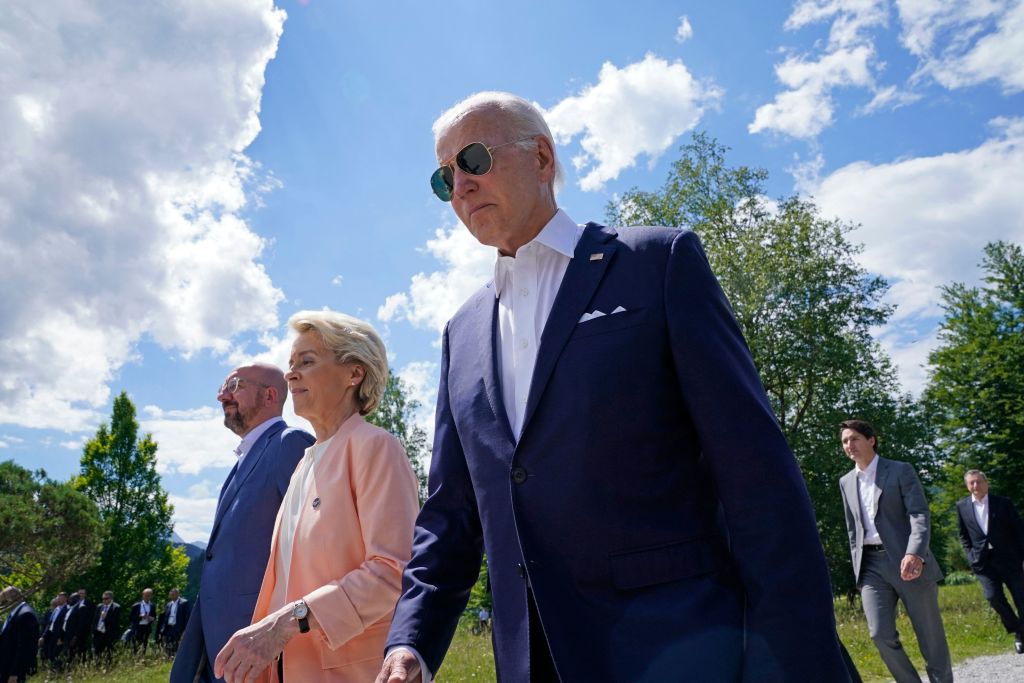
For decades, climate change has largely been left on the backburner in diplomatic discussions among world leaders. The issue typically ranked near the bottom of a long list of priorities discussed at meetings and summits.
So it may come as a surprise that as a war rages in Europe and tensions between China and the West simmer, the most highly anticipated item of discussion when European Union Commission President Ursula von der Leyen meets with U.S. President Joe Biden in Washington this Friday will be climate change.
Both the U.S. and the E.U. have placed emissions reduction programs at the center of their economic growth plans—and put hundreds of billions of dollars behind those plans, to boot. That investment has led to far-reaching and, to some degree, unanticipated consequences as leaders on both sides of the Atlantic grapple with the new shape of the global economy.
Officials say the meeting between Biden and von der Leyen will help pave the way forward for constructive trans-Atlantic climate cooperation. But it just scratches the surface of what’s to come. As the transition to a clean economy accelerates, climate change is increasingly poised to occupy center stage in international relations.
The seeping in of climate change into geopolitical discussions came slowly and then all at once. For decades, countries have gathered in international meetings to talk about climate change, but the discussions were mostly left to environment-focused officials. When heads of government showed up, they either made speeches and then went home, or, worse, got in the way of negotiations.
But, in the years since the onset of COVID-19, the world’s biggest economies have increasingly intertwined climate policy with economic policy. China has continued its long-standing pursuit of serving as the world’s clean energy manufacturer, supporting the production of solar panels and other technology. The E.U. has created new policies to direct financing to clean energy technologies. And the U.S. passed the enormous Inflation Reduction Act (IRA), which includes $369 billion to help accelerate the transition.
A version of this story also appears in the Climate is Everything newsletter. To sign up, click here.
These economic measures were all intended to help local economies, but it didn’t take long for countries to start taking note of their geopolitical ramifications. The E.U.—and others—complained that the U.S. was unfairly favoring its own industries with the IRA. Meanwhile, the U.S. called on the E.U. to enact new climate spending rules—and sought to shift criticism to China for the country’s long-time state sponsorship of industry. And while these complaints may once have been delivered in backroom conversations between diplomats, they are now being leveled at the highest levels of government. French President Emmanuel Macron, for example, told Biden in December that the IRA was “super aggressive” toward French companies; Biden promised to help soften the blow.
Temperatures have come down since then as leaders in the U.S. and Europe have promised to work together. Now, the question is how. The U.S. and the E.U. are currently working on a deal to make European minerals eligible for U.S. tax incentives. A bigger move would allow the two jurisdictions to enjoy free-trade status. “We have a real common interest in secure, reliable, friendly, supply chains,” says John Podesta, the Biden adviser charged with overseeing implementation of the IRA. “We need to find a way of decarbonizing the path forward.”
The summit this week is just the beginning.
More Must-Reads from TIME
- Cybersecurity Experts Are Sounding the Alarm on DOGE
- Meet the 2025 Women of the Year
- The Harsh Truth About Disability Inclusion
- Why Do More Young Adults Have Cancer?
- Colman Domingo Leads With Radical Love
- How to Get Better at Doing Things Alone
- Michelle Zauner Stares Down the Darkness
Write to Justin Worland at justin.worland@time.com